Welcome back to This Week in Apps, the weekly TechCrunch series that recaps the latest in mobile OS news, mobile applications and the overall app economy.
The app industry is as hot as ever, with a record 218 billion downloads and $143 billion in global consumer spend in 2020.
Consumers last year also spent 3.5 trillion minutes using apps on Android devices alone. And in the U.S., app usage surged ahead of the time spent watching live TV. Currently, the average American watches 3.7 hours of live TV per day, but now spends four hours per day on their mobile devices.
Apps aren’t just a way to pass idle hours — they’re also a big business. In 2019, mobile-first companies had a combined $544 billion valuation, 6.5x higher than those without a mobile focus. In 2020, investors poured $73 billion in capital into mobile companies — a figure that’s up 27% year-over-year.
This Week in Apps will soon be a newsletter! Sign up here: techcrunch.com/newsletters
This week we’re looking into the upcoming Apple lawsuit with Epic Games over App Store fees, the soon-to-launch game changer that is App Tracking Transparency and Facebook’s latest attempt to take on Clubhouse, among other things.
Epic vs Apple trial nears
Image Credits: Bryce Durbin
The Epic Games versus Apple trial is nearing launch. The trial, which begins May 3 and is expected to drag on for weeks, will see the Fortnite maker attempting to argue that Apple’s control over the App Store — and the 30% commission it requires on in-app purchases — represents anti-competitive behavior from a monopoly that requires regulation under antitrust law. Apple, meanwhile, feels confident that it can demonstrate its not a monopoly as it faces competition across the market, not just in its App Store. It will also likely point to the commission decreases it recently made in the wake of the increased regulatory scrutiny. Apple now takes a smaller 15% cut from developers making less than $1 million in revenues.
New filings this week detail Epic’s long-term program “Project Liberty,” which describes how Epic planned its antitrust battle by forcing app stores to reject Fortnite for circumventing their payment mechanisms. A filing from Epic also references comments by Apple’s senior vice president of Internet Software and Services Eddie Cue, senior vice president of software engineering Craig Federighi and Apple Fellow Phil Schiller that talk about how Apple locks users into its ecosystem with its services, including iMessage. Epic also argues that Apple uses security as a “pretext” for its commissions — even as a recent series of allegations (and threat of a lawsuit) from app developer Kosta Eleftheriou have demonstrated that Apple’s vetting process is failing to stop massive scams. Epic also says that allowing Apple to serve customers’ refund requests leads to fraud because it doesn’t have the same visibility into the developer’s content that the developer itself does.
Apple shares more ATT details
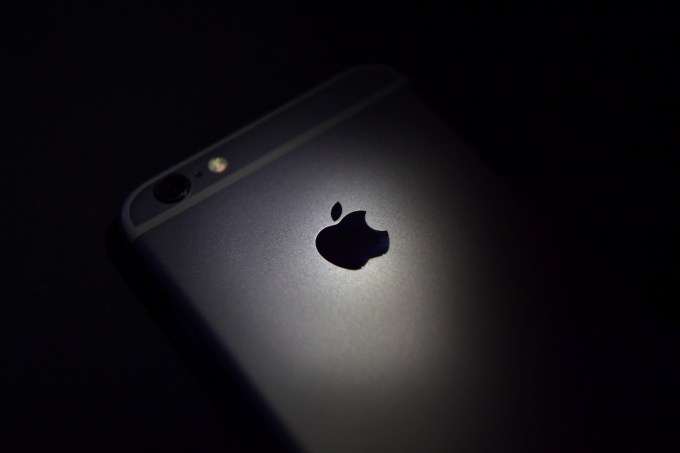
LONDON, ENGLAND – AUGUST 03: The Apple logo is displayed on the back of an iPhone on August 3, 2016 in London, England. (Photo by Carl Court/Getty Images)
With the public release of iOS 14.5, which is expected soon, Apple will be shaking up the app economy with the launch of its App Tracking Transparency framework, or ATT. This requires iOS apps to begin prompting users for permission to track their users’ activity, instead of just quietly doing so — generally without the user’s informed consent. Apple has said developers can explain in this prompt why they’re asking for this permission — for example, because they want to serve more personalized ads, perhaps. Tech giants like Facebook and Google, as well as many other ad-supported apps (and particularly social media apps), will be impacted by the change. Some have even gone so far as to try to find workarounds using non-IDFA methods, it’s been reported (IDFA being the current system that assigns a unique advertising ID to each device that is then tracked across the apps and websites a user visits). It was revealed last week that Snapchat had investigated an IDFA alternative known as probabilistic matching, but claims it was just a “test.” Meanwhile, China’s largest tech companies — including Baidu, Tencent and ByteDance — have been exploring a state-backed IDFA alternative CAID.
This week, Apple made it clear that “no tracking” without permission means just that. It says that if a user opts out of any IDFA-tracking via the pop-up, that means the developer doesn’t have permission to track using any other sort of identifiers either — like hashed email addresses or whatever other workaround developers come up with.
Facebook tries another Clubhouse rival
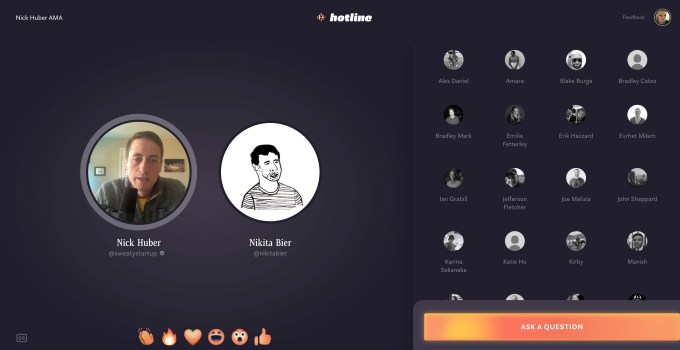
Image Credits: Hotline
Facebook’s internal R&D group, NPE Team, this week launched its latest experiment, Hotline, into public beta testing. The web-based application could be described as a mashup of Instagram Live and Clubhouse, as it allows creators to speak to an audience who can then ask questions through either text or audio. However, unlike Clubhouse, creators can opt to turn their cameras on for the event, instead of being audio-only. Currently, users sign in with Twitter and then verify their phone number to authenticate with the app. They can then type in their question to submit it to the speaker, who pulls them “on stage” to discuss. For now, the participants were audio-only and represented by a profile icon, but settings suggest that Hotline will test video for users in the future.
As the questions are asked, users can react with emoji, including clapping hands, fire, heart, laughter, surprise and thumbs up. And most importantly, unlike Clubhouse, Hotline events are recorded. Creators get both an audio and video recording that they could edit and upload elsewhere, including on other social networks. Because of its use of video, upvoted questions and recording, the app has a different vibe than Clubhouse — it feels more like a virtual event than a more casual space. Facebook is catering to this audience, too, by seeking out creators who are focused on doling out professional advice, it says.
Of note, Hotline is being led by Eric Hazzard, who joined Facebook when it acquired his app tbh, a positivity-focused Q&A app.
Platforms: Apple
Still more betas. Apple this week released its seventh betas for iOS 14.5, iPadOS 14.5 and other platforms, including Apple TV and Apple Watch — iOS 14.5 brings the rollout of App Tracking Transparency, which is why Apple is probably taking its time with this one.
iOS 14 adoption has now surpassed 90% according to data from Mixpanel. In December, 81% of phones were running iOS 14, now 90.45% are. Another 5.07% of users are running iOS 13, while 4.48% are running iOS 12 or older versions.
Apple has been spotted testing tags in the App Store that will help guide users to more precise search results. The test, first reported by MacRumors, had users encounter tags at the top of App Store search results when searching for popular terms like “photos” or “wallpaper,” that could help narrow results. Some users were running the iOS 14.5 beta when they saw tags, but others were not. It’s unclear if or when tags will launch to the wider public.

A search tag is a search term used by people when searching in the App Store to filter the search results, so the more specific a user is the less tags there are for them to use for filtering. pic.twitter.com/jc4JbtHixd
— Nick (@nickjsheriff) March 21, 2021
Apple opens up its Find My app to third-party products and launches a new app to test them. The company has still not launched its own AirTags, a lost-item finder similar to Tile. Instead, it’s smartly positioning the Find My app as a platform anyone can plug into, in order to assuage anti-competitive concerns. The first items that will plug into Find My include VanMoof’s S3 and X3 e-bikes, Belkin’s SoundForm Freedom True Wireless Earbuds and the Chipolo ONE Spot tracker (a Tile rival).
However, one big name is notably missing from the lineup, and that’s AirTags’ biggest competitor, Tile itself. Tile doesn’t want to hand over the direct customer relationship it has by way of its Tile app just to be included in Find My. And some have suggested Apple is propping up the Chipolo tracker to counter any arguments from Tile that it’s being anti-competitive with the launch of AirTags when they finally arrive.
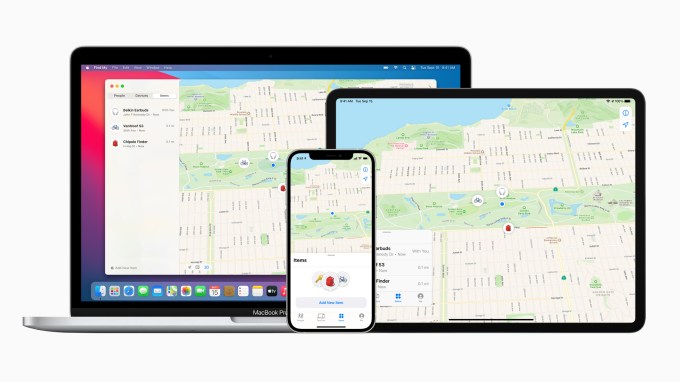
Image Credits: Apple
Apple updated its App Store Connect and Apple Music for Artists app icons to look more like the design choices used on macOS Big Sur. That’s leading to speculation that iOS 15 could also adopt the look of Big Sur when it comes to design.
![]()
Image Credits: Appleinsider (opens in a new window)
Apple details its App Store takedowns in new transparency report. Apple’s latest transparency report offers information about app takedowns due to requests from government authorities due to suspected violations of local laws. Apple says it complies with these requests where it’s legally required to do so. These requests, however, are not focused on Apple’s own editorial guidelines, which prohibit content that Apple itself chooses not to host.
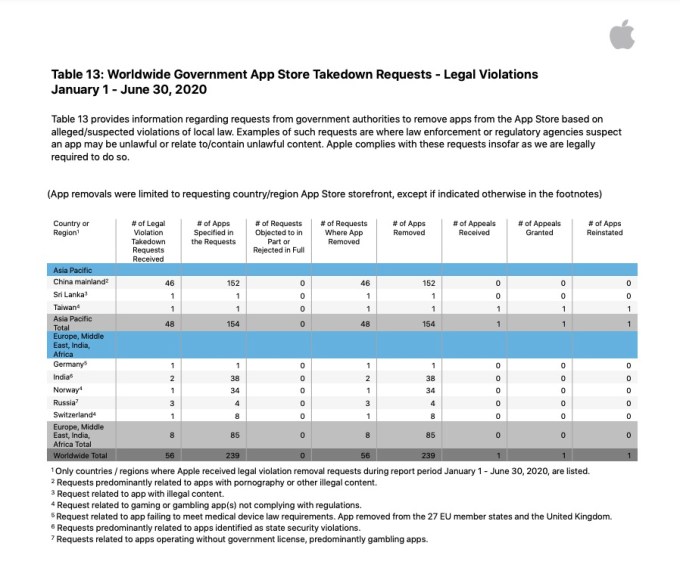
Platforms: Google
The new Google Play Store design arrives, killing off the hamburger menu for good. The design is rolling out to Android devices. An in-app message tells you that those menu items have been moved to your profile icon, which, when tapped, brings up a condensed menu. The Settings menu was also updated. Some have complained the changes are making menu items and options harder to find. The Play Store hadn’t been updated significantly since 2019.
I get that nobody likes hamburger menus anymore (I think they’re fine!), but it was dumb when Apple hid a bunch of App Store functions under your profile photo and it’s dumb that Google Play is following https://t.co/KTPfy8SaCR
— Dieter Bohn (@backlon) April 7, 2021
Google announced a new app review process across AdMob and Ad Manager which will evaluate a mobile app’s inventory quality before allowing unrestricted ad serving. The process will give publishers feedback on their apps’ approval status so they can resolve issues that could lead to policy violations. Google says the new app reviews are being rolled out gradually in 2021 with two features: app readiness and app claiming. The former will require publishers to link apps they want to monetize with one supported app store, so their app can then be reviewed. The process will check the app source, publisher’s ownership and policy compliance. App Claiming will provide a list of apps that are being monetized with their ad code but aren’t yet on their AdMob or Ad Manager account.
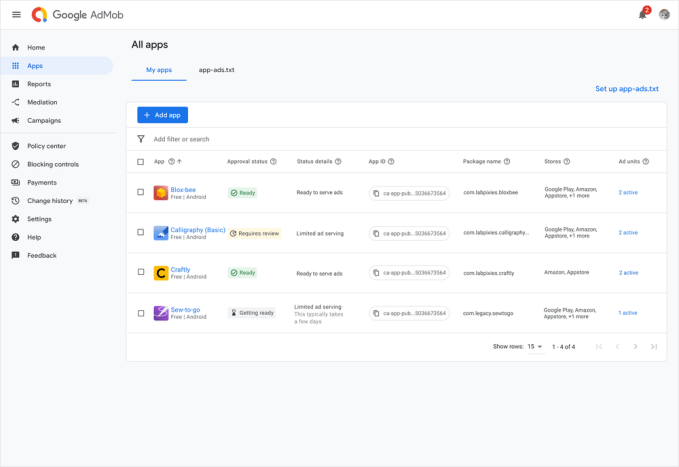
Image Credits: Google
Android Auto apps can now be launched into production, Google announced this week, following months of testing. That means developers can now publish apps for navigation, parking and charging to Google Play without needing to sign up for a beta program.
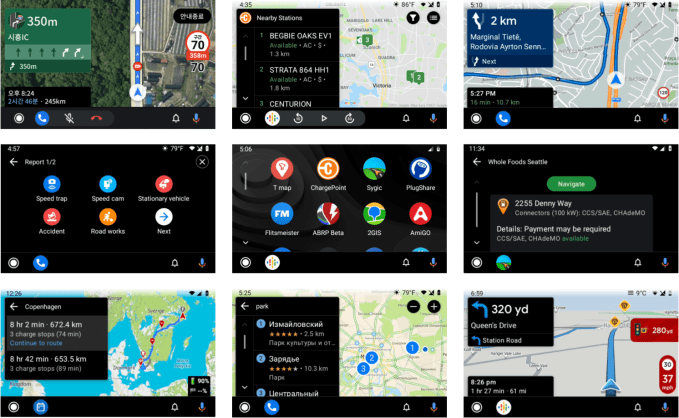
Image Credits: Google
Android 12 may make it easier for third-party launchers to operate, as it will allow them access to perform universal device searches. The change was spotted in a new API (AppSearchManager API) by the developer of the Niagara Launcher.
All of Google’s flagship iOS apps have now adopted Apple’s new privacy nutrition labels, as Google Photos was finally updated on Tuesday.
Trends
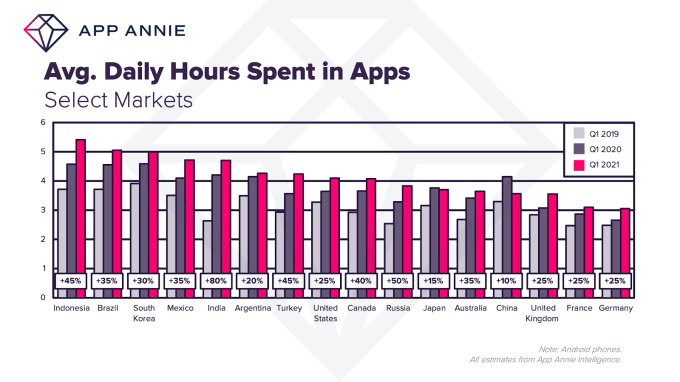
Image Credits: App Annie
Consumers now average 4.2 hours per day in apps, up 30% from 2019. In the first quarter of 2021, the daily time spent in apps surpassed four hours in the U.S., Turkey, Mexico and India for the first time, the report notes. Of those, India saw the biggest jump as consumers there spent 80% more time in smartphone apps in the Q1 2021 versus the first quarter of 2019.
45% of apps used in Q1 2021 were games and 36% of gamers said they were now playing more mobile games compared to before the pandemic, AdColony said. In the first two weeks of 2021, the top 10 casual games saw 80 million downloads.
E-commerce
WhatsApp now allows business owners to manage their catalogs through the web and on desktop. The catalog feature was introduced in the messaging app in 2019 to allow businesses to better manage their inventory. To date, more than 8 million business catalogs are now live on the platform.
Fintech
Free trading app Robinhood says crypto trading has spiked to 9.5 million customers in the first quarter. That’s up from the 1.7 million customers who traded crypto in the 2020 fourth quarter.
Private messaging app Signal began testing payments in the U.K. using the cryptocurrency MobileCoin (MOB). The beta program will allow users to access a new Signal Payments feature in the app where they can then link a MobileCoin wallet after buying the cryptocurrency on the exchange FTX. Once set up, you can then send MOB to anyone else on the app who also has a linked wallet.
Social
Twitter is said to have discussed a $4 billion acquisition of hot new audio app Clubhouse, Bloomberg reported. TechCrunch also confirmed the talks, but understands they’re no longer taking place. Bloomberg had earlier reported Clubhouse is now looking to raise a round, also at a $4 billion valuation.
TikTok announces six new interactive music effects to keep its audience engaged as competition heats up, with tech giants Facebook, YouTube and Snap all releasing TikTok clones. The first effect is Music Visualizer, which runs real-time beat tracking to animate a retro greenscreen landscape. In less than a day since its debut, over 28,000 videos had used the effect.
TikTok rolls out a new feature, auto captions, to make its short-form videos more accessible to hard of hearing and deaf. Creators can enable the feature during editing, which could also be useful for times when you want to listen to TikTok privately but don’t have your headphones.
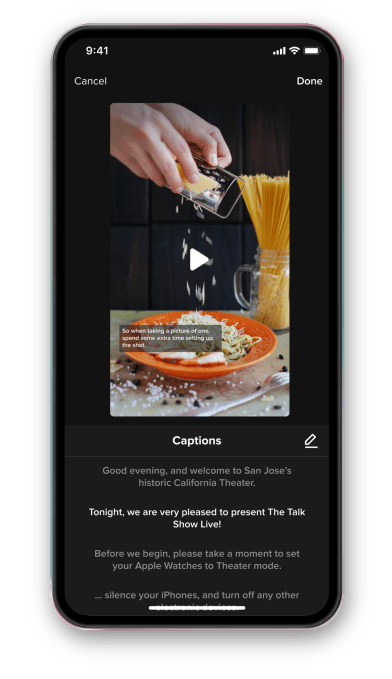
Image Credits: TikTok
A group of lawmakers wrote to Facebook CEO Mark Zuckerberg to press the company for information about its plan to create a curated version of Instagram for children under 13. Facebook already offers an under-13 app, Messenger Kids, and its rival TikTok offers an age-gated experience as well for under-13 users. Lawmakers expressed skepticism that Facebook would keep children’s data private.
Reddit drops support for iOS 12 and lower, given that iOS adoption for later versions now reaches the vast majority of users.
Tim Cook talked about the banned right-wing app Parler in a wide-ranging interview on The NYT’s “Sway” podcast. He made a straightforward case as to why the app needed to be removed, but also said he hoped they’d try to return. “I hope that they come back on. Because we work hard to get people on the store, not to keep people off the store,” Cook said. “And so, I’m hoping that they put in the moderation that’s required to be on the store and come back, because I think having more social networks out there is better than having less,” he added.
Messaging
WhatsApp was spotted testing a feature that would allow users to migrate their chat history between devices (iOS and Android, that is).
Group chat app Discord said it banned over 2,000 extremist communities in the second half of last year — nearly double the number it banned during the first half of the year, when the Capitol riot took place. Around 1,500 of the communities were first detected by the company. Discord had reportedly been talking to Microsoft about an acquisition.
Streaming & Entertainment
Spotify launched (but didn’t initially announce…until a slew of media reports forced their hand) a voice command feature, “Hey Spotify.” The feature lets you call up artists, songs, albums and playlists by name after first opting in and enabling the microphone permission. This will allow Spotify to listen and record your voice data once it hears the wake words, “Hey Spotify.” The company wouldn’t answer questions about the feature, which seems to indicate the rumors that Spotify is readying the launch of its in-car hardware, Car Thing, may actually be true.
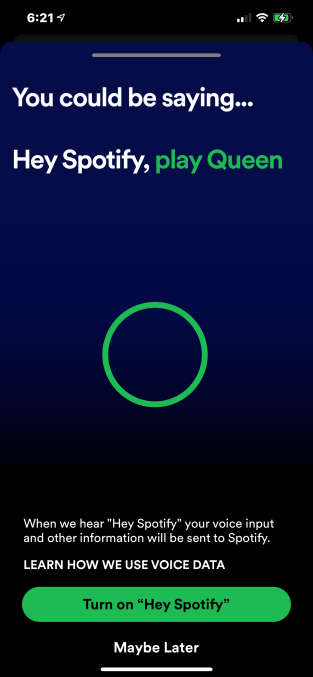
Image Credits: Spotify screenshot iOS
Clubhouse launches payments so creators can make money from their shows. Users will be able to send money to favorite creators, which Clubhouse says it’s not taking a cut from — hoping to avoid the Apple tax on in-app purchases through the donations carve-out Apple agreed to for Tencent in 2018. Creators will have to enable the new virtual tip jar feature in order to accept payments.
YouTube Music’s mobile app is getting a design refresh. The app has begun testing new iconography that matches the update the YouTube mobile app received last year, when it dropped the gray icons for the more visually distinct ones.
The YouTube Kids app has rolled out to 11 new markets, including Bolivia, Costa Rica, Dominican Republic, Ecuador, El Salvador, Guatemala, Honduras, Nicaragua, Panama, Paraguay and Uruguay.
As rumors about Spotify’s launch of “Car Thing” swirl, Amazon Music debuts a “Car Mode” that makes its music app easier to use while driving, with features like bigger text, bigger buttons and even Alexa built in — the latter countering Spotify’s launch of “Hey Spotify” voice commands.
Gaming
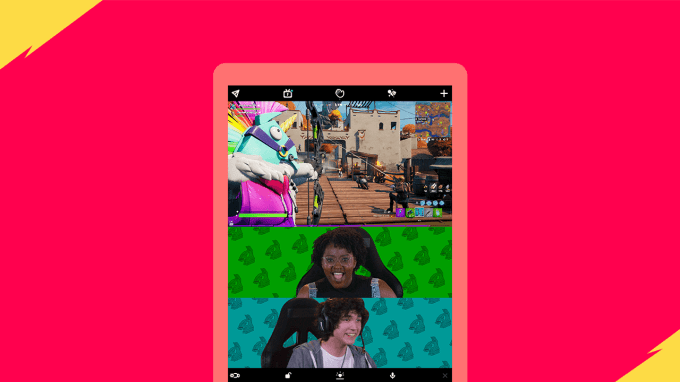
Image Credits: Epic Games/Houseparty
Fortnite users can now livestream gameplay to Houseparty’s social app, which Epic Games (Fortnite’s maker) also owns. To use the new feature, the Fortnite player will need to have enabled Fortnite Mode Streaming and be connected to Houseparty. When they begin to stream their gameplay, their friends on Houseparty will be notified that their game feeds are now available to watch. The addition follows Houseparty’s launch of a “Fortnite Mode” last November, which added a video chat feature to Fortnite where players could see live feeds from their friends while gaming, powered by Houseparty.
Google opened up applications for its 2021 Change The Game Design Challenge, which will again be virtual. Participants who are chosen will be invited to an online game development workshop hosted by Google’s partner, Girls Make Games. The workshop will offer four sessions, kicking off in June and running through the end of the summer. At the end of the workshop, participants will have learned skills needed to create a playable game, no coding experience required.
Apple was hit with a class action lawsuit, filed in the U.S. District Court for the Northern District of California, which claims that Apple runs an “unlicensed casino” due to its hosting of free-to-play casino games. Though the games use virtual currency, the lawsuit notes that users can buy more coins with real money. The suit says this violates the anti-gambling laws of at least 25 U.S. states.
Health & Fitness
French startup Nabla launched its new app focused on women’s health, allowing women to chat with practitioners, access community content, centralize all their medical data and, soon, schedule telemedicine appointments. The startup has raised $20.2 million for its app and has a team of doctors on board to answer user questions.
Government & Policy
Apple must now show a set of Russian-made apps during iPhone setup, according to a new law that went into effect in early April. Apps getting a boost from the suggestions include Mail.ru, OK Live, VK and others. The apps are not being pre-installed as it turns out, but are being offered for download during the final step of the setup process.
Security & Privacy
Facebook is facing questions from the EU’s data protection regulator over the 2019 data breach that exposed, among other things, the emails and phone numbers of more than 500 million Facebook users. The breach was reported last weekend by Business Insider, leading to concerns. Facebook says the data dump was related to a vulnerability it had fixed back in August 2019. It later explained that the data was scraped from user profiles using a contact importer feature before Facebook made changes to the tool to prevent abuse.













Halo AR
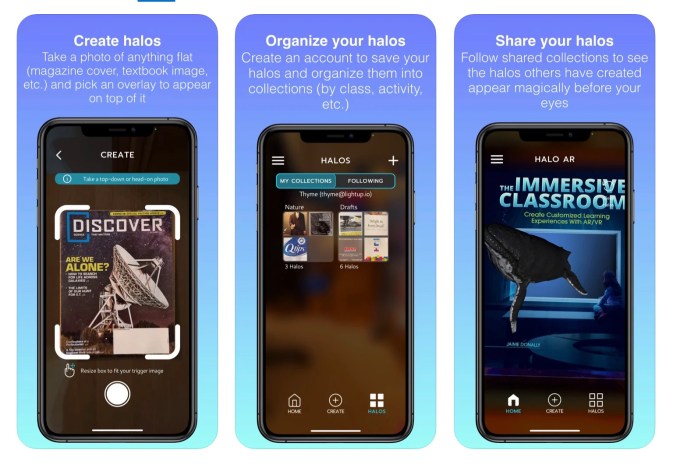
Image Credits: LightUp
This relatively new AR app lets you add AR to anything — a textbook, a magazine cover, a piece of paper, a photo or any other flat real-world object. To use Halo AR, you first select the object and snap a photo, then choose which photo, video or 3D model you want to overlay on top of it. Teachers can use the app to “tag” their course materials with AR links of sorts to immersive content or videos. Or you could use it for fun to create a scavenger hunt in the house for the kids. The app is a free download in the Education category on iOS and Android.
SmartGym
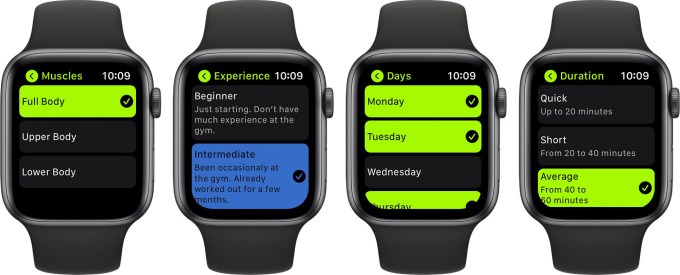
Image Credits: SmartGym
This popular gym app for Apple devices, and one of Apple’s favorite Apple Watch apps of the year, got a big update this week. The new version of SmartGym more than doubles the number of exercises, growing the database of 290 exercises with the addition of over 330 more — including for those who work out at home with bands, resistance loops, TRX and more. The app’s AI Smart Trainer can then use these new exercises to make its personalized recommendations for you. There are new pre-made workouts for boxing, martial arts and even ultimate frisbee in the updated app.
Apple has taken down over a hundred apps based on the scams I’ve exposed, which have costed unsuspecting users millions of dollars.
How can I keep finding these so easily, without any internal Apple data or tools, and they can’t?https://t.co/8V8RSff5uG
— Kosta Eleftheriou (@keleftheriou) April 9, 2021
I believe both of these are true:
1. Apple’s arguments to prohibit third-party IAP methods for digital goods are flimsy, unreasonable, and anticompetitive;
and
2. Apple’s IAP system is easier for most customers, and it should compete with its merits on a level playing field. https://t.co/C86iI3s9mT
— Marco Arment (@marcoarment) April 9, 2021

